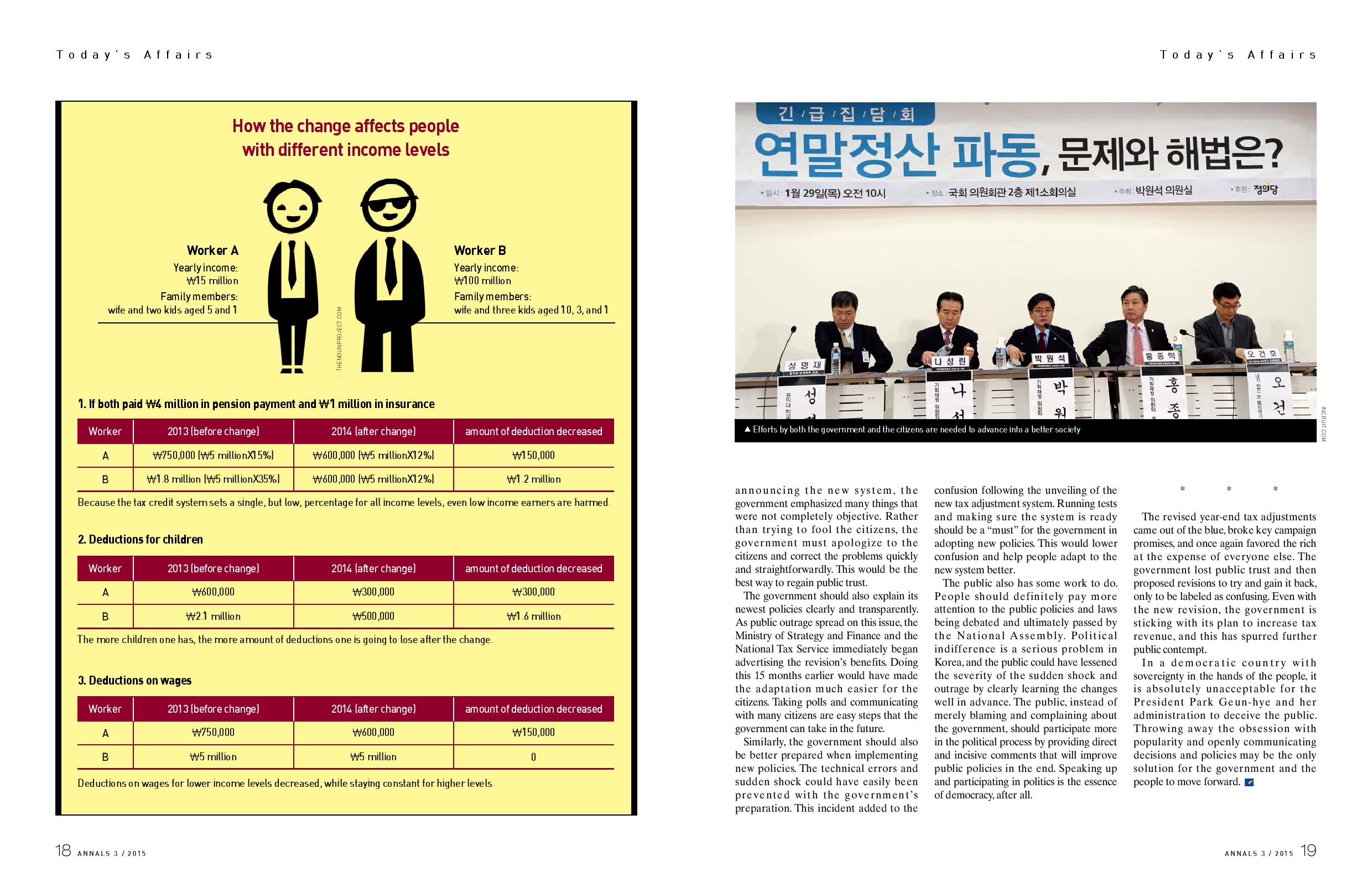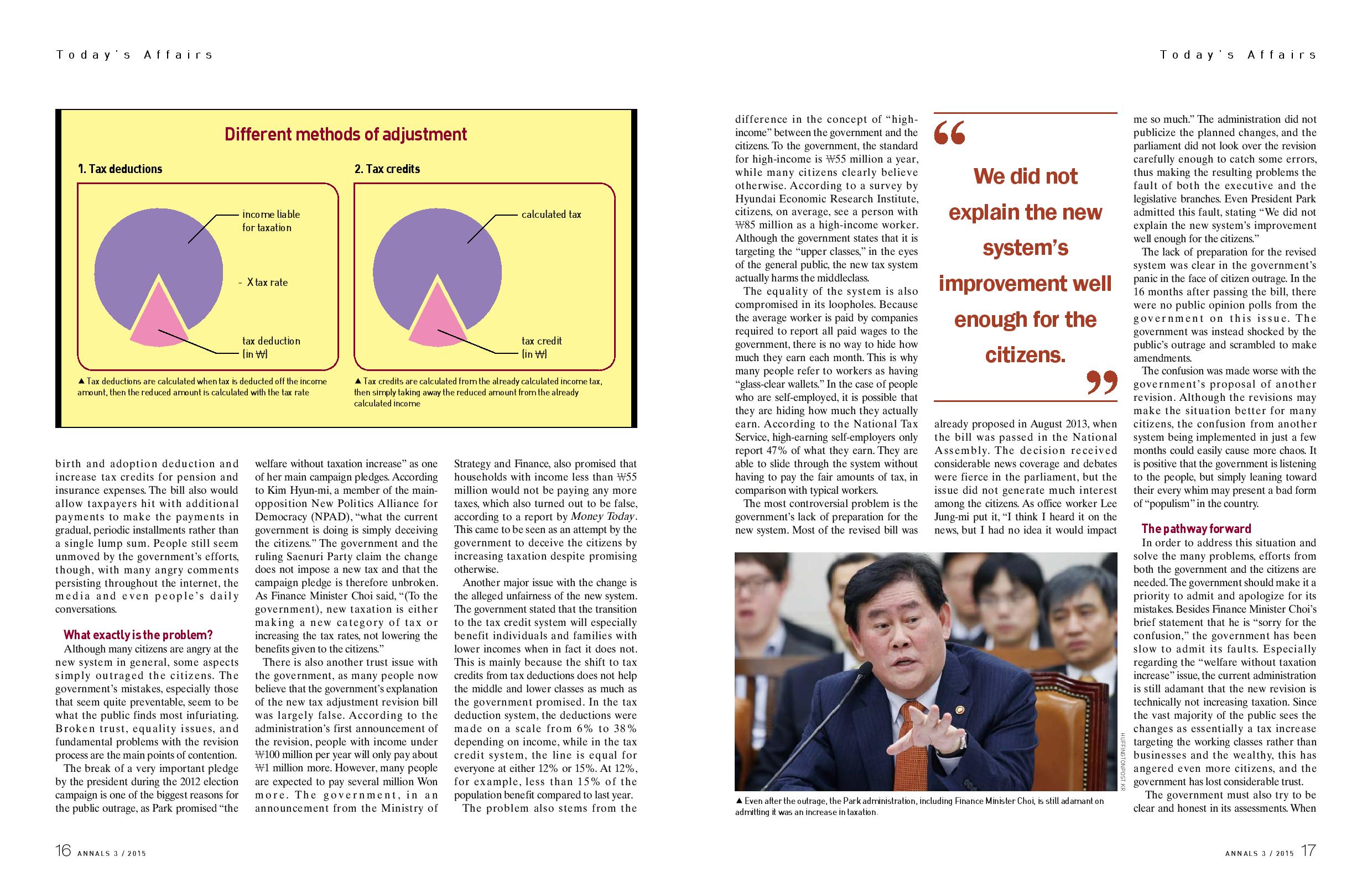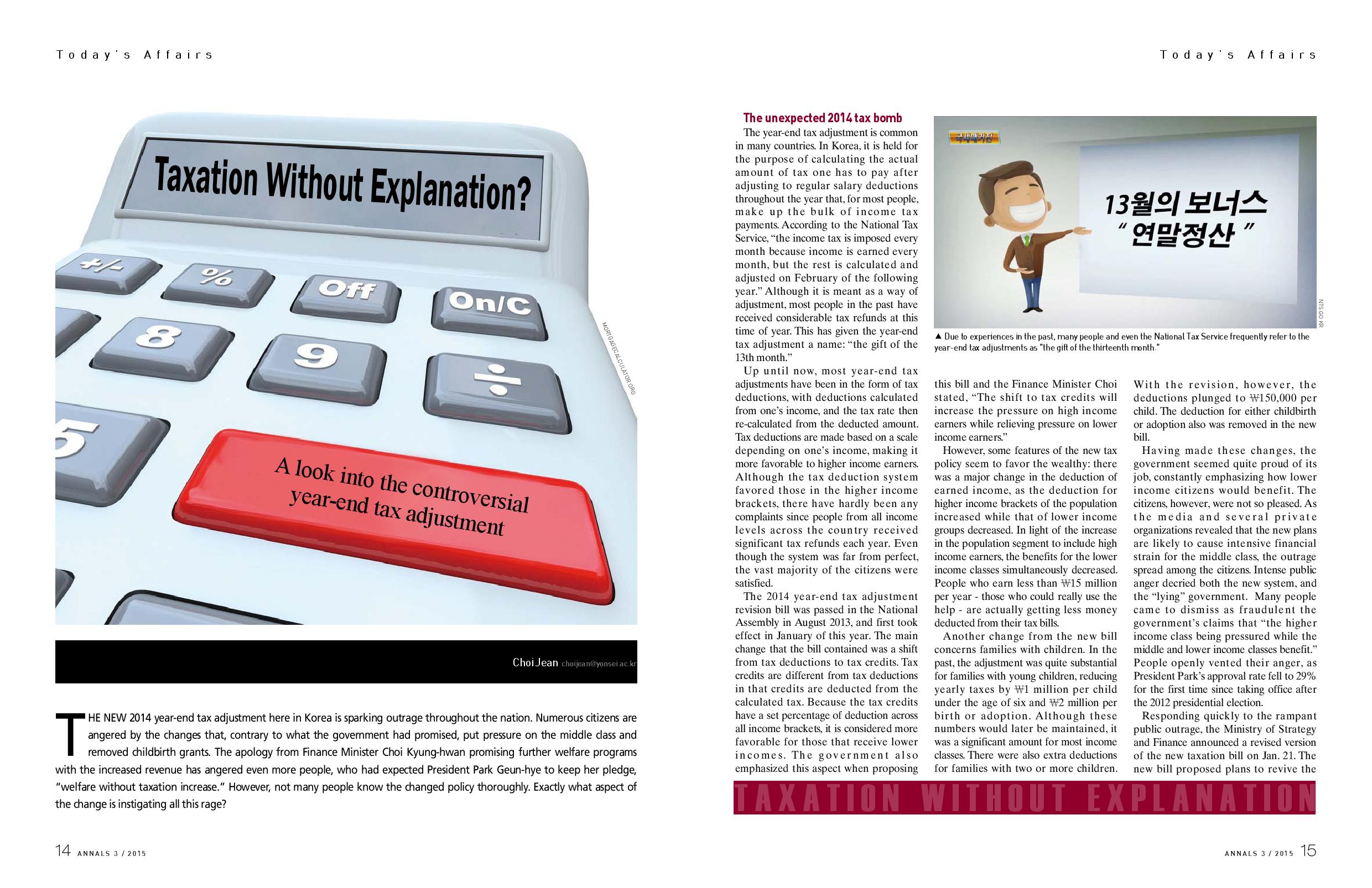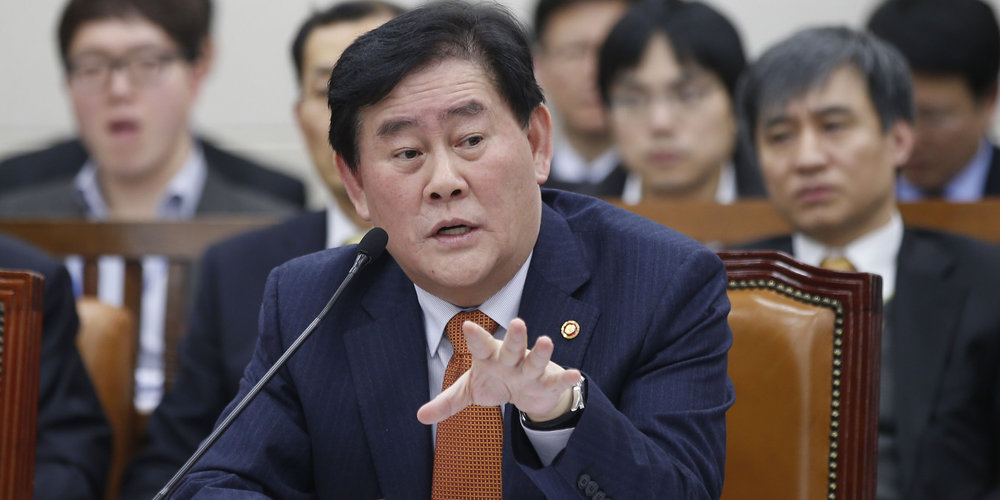A look into the controversial year-end tax adjustment




THE NEW 2014 year-end tax adjustment here in Korea is sparking outrage throughout the nation. Numerous citizens are angered by the changes that, contrary to what the government had promised, put pressure on the middle class and removed childbirth grants. The apology from Finance Minister Choi Kyung-hwan promising further welfare programs with the increased revenue has angered even more people, who had expected President Park Geun-hye to keep her pledge, “welfare without taxation increase.” However, not many people know the changed policy thoroughly. Exactly what aspect of the change is instigating all this rage?
The unexpected 2014 tax bomb
The year-end tax adjustment is common in many countries. In Korea, it is held for the purpose of calculating the actual amount of tax one has to pay after adjusting to regular salary deductions throughout the year that, for most people, make up the bulk of income tax payments. According to the National Tax Service, “the income tax is imposed every month because income is earned every month, but the rest is calculated and adjusted on February of the following year.” Although it is meant as a way of adjustment, most people in the past have received considerable tax refunds at this time of year. This has given the year-end tax adjustment a name: “the gift of the 13th month.”
Up until now, most year-end tax adjustments have been in the form of tax deductions, with deductions calculated from one’s income, and the tax rate then re-calculated from the deducted amount. Tax deductions are made based on a scale depending on one’s income, making it more favorable to higher income earners. Although the tax deduction system favored those in the higher income brackets, there have hardly been any complaints since people from all income levels across the country received significant tax refunds each year. Even though the system was far from perfect, the vast majority of the citizens were satisfied.
The 2014 year-end tax adjustment revision bill was passed in the National Assembly in August 2013, and first took effect in January of this year. The main change that the bill contained was a shift from tax deductions to tax credits. Tax credits are different from tax deductions in that credits are deducted from the calculated tax. Because the tax credits have a set percentage of deduction across all income brackets, it is considered more favorable for those that receive lower incomes. The government also emphasized this aspect when proposing this bill and the Finance Minister Choi stated, “The shift to tax credits will increase the pressure on high income earners while relieving pressure on lower income earners.”
However, some features of the new tax policy seem to favor the wealthy: there was a major change in the deduction of earned income, as the deduction for higher income brackets of the population increased while that of lower income groups decreased. In light of the increase in the population segment to include high income earners, the benefits for the lower income classes simultaneously decreased. People who earn less than 15 million per year - those who could really use the help - are actually getting less money deducted from their tax bills.
Another change from the new bill concerns families with children. In the past, the adjustment was quite substantial for families with young children, reducing yearly taxes by 1 million per child under the age of six and 2 million per birth or adoption. Although these numbers would later be maintained, it was a significant amount for most income classes. There were also extra deductions for families with two or more children. With the revision, however, the deductions plunged to 150,000 per child. The deduction for either childbirth or adoption also was removed in the new bill.
Having made these changes, the government seemed quite proud of its job, constantly emphasizing how lower income citizens would benefit. The citizens, however, were not so pleased. As the media and several private organizations revealed that the new plans are likely to cause intensive financial strain for the middle class, the outrage spread among the citizens. Intense public anger decried both the new system, and the “lying” government. Many people came to dismiss as fraudulent the government’s claims that “the higher income class being pressured while the middle and lower income classes benefit.” People openly vented their anger, as President Park’s approval rate fell to 29% for the first time since taking office after the 2012 presidential election.
Responding quickly to the rampant public outrage, the Ministry of Strategy and Finance announced a revised version of the new taxation bill on Jan. 21. The new bill proposed plans to revive the birth and adoption deduction and increase tax credits for pension and insurance expenses. The bill also would allow taxpayers hit with additional payments to make the payments in gradual, periodic installments rather than a single lump sum. People still seem unmoved by the government’s efforts, though, with many angry comments persisting throughout the internet, the media and even people’s daily conversations.
What exactly is the problem?
Although many citizens are angry at the new system in general, some aspects simply outraged the citizens. The government’s mistakes, especially those that seem quite preventable, seem to be what the public finds most infuriating. Broken trust, equality issues, and fundamental problems with the revision process are the main points of contention.
The break of a very important pledge by the president during the 2012 election campaign is one of the biggest reasons for the public outrage, as Park promised “the welfare without taxation increase” as one of her main campaign pledges. According to Kim Hyun-mi, a member of the main-opposition New Politics Alliance for Democracy (NPAD), “what the current government is doing is simply deceiving the citizens.” The government and the ruling Saenuri Party claim the change does not impose a new tax and that the campaign pledge is therefore unbroken. As Finance Minister Choi said, “(To the government), new taxation is either making a new category of tax or increasing the tax rates, not lowering the benefits given to the citizens.”
There is also another trust issue with the government, as many people now believe that the government’s explanation of the new tax adjustment revision bill was largely false. According to the administration’s first announcement of the revision, people with income under 100 million per year will only pay about 1 million more. However, many people are expected to pay several million Won more. The government, in an announcement from the Ministry of Strategy and Finance, also promised that households with income less than 55 million would not be paying any more taxes, which also turned out to be false, according to a report by *Money Today*. This came to be seen as an attempt by the government to deceive the citizens by increasing taxation despite promising otherwise.
Another major issue with the change is the alleged unfairness of the new system. The government stated that the transition to the tax credit system will especially benefit individuals and families with lower incomes when in fact it does not. This is mainly because the shift to tax credits from tax deductions does not help the middle and lower classes as much as the government promised. In the tax deduction system, the deductions were made on a scale from 6% to 38% depending on income, while in the tax credit system, the line is equal for everyone at either 12% or 15%. At 12%, for example, less than 15% of the population benefit compared to last year.
The problem also stems from the difference in the concept of “high-income” between the government and the citizens. To the government, the standard for high-income is 55 million a year, while many citizens clearly believe otherwise. According to a survey by Hyundai Economic Research Institute, citizens, on average, see a person with 85 million as a high-income worker. Although the government states that it is targeting the “upper classes,” in the eyes of the general public, the new tax system actually harms the middleclass.
The equality of the system is also compromised in its loopholes. Because the average worker is paid by companies required to report all paid wages to the government, there is no way to hide how much they earn each month. This is why many people refer to workers as having “glass-clear wallets.” In the case of people who are self-employed, it is possible that they are hiding how much they actually earn. According to the National Tax Service, high-earning self-employers only report 47% of what they earn. They are able to slide through the system without having to pay the fair amount of tax, in comparison with typical workers.
The most controversial problem is the government’s lack of preparation for the new system. Most of the revised bill was already proposed in August, 2013, when the bill was passed in the National Assembly. The decision received considerable news coverage and debates were fierce in the parliament, but the issue did not generate much interest among the citizens. As office worker Lee Jung-mi put it, “I think I heard it on the news, but I had no idea it would impact me so much.” The administration did not publicize the planned changes, and the parliament did not look over the revision carefully enough to catch some errors, thus making the resulting problems it the fault of both the executive and the legislative branches. Even President Park admitted this fault, stating “We did not explain the new system’s improvement well enough for the citizens.”
The lack of preparation for the revised system was clear in the government’s panic in the face of citizen outrage. In the 16 months after passing the bill, there were no public opinion polls from the government on this issue. The government was instead shocked by the public’s outrage and scrambled to make amendments. The technical errors, most conspicuously the failure of several credit card companies to report transportation.
The confusion was made worse with the government’s proposal of another revision. Although the revisions may make the situation better for many citizens, the confusion from another system being implemented in just a few months could easily cause more chaos. It is positive that the government is listening to the people, but simply leaning toward their every whim may present a bad form of “populism” in the country.
The pathway forward
In order to address this situation and solve the many problems, efforts from both the government and the citizens are needed. The government should make it a priority to admit and apologize for its mistakes. Besides Finance Minister Choi’s brief statement that he is “sorry for the confusion,” the government has been slow to admit its faults. Especially regarding the “welfare without taxation increase” issue, the current administration is still adamant that the new revision is technically not increasing taxation. Since the vast majority of the public sees the changes as essentially a tax increase targeting the working classes rather than businesses and the wealthy, this has angered even more citizens, and the government has lost considerable trust.
The government must also try to be clear and honest in its assessments. When announcing the new system, the government emphasized many things that were not completely objective. Rather than trying to fool the citizens, the government must apologize to the citizens and correct the problems quickly and straightforwardly. This would be the best way to regain public trust.
The government should also explain its newest policies clearly and transparently. As public outrage spread on this issue, the Ministry of Strategy and Finance and the National Tax Service immediately began advertising the revision’s benefits. Doing this 15 months earlier would have made the adaptation much easier for the citizens. Taking polls and communicating with many citizens are easy steps that the government can take in the future.
Similarly, the government should also be better prepared when implementing new policies. The technical errors and sudden shock could have easily been prevented with the government’s preparation. This incident added to the confusion following the unveiling of the new tax adjustment system. Running tests and making sure the system is ready should be a ‘must’ for the government in adopting new policies. This would lower confusion and help people adapt to the new system better.
The public also has some work to do. People should definitely pay more attention to the public policies and laws being debated and ultimately passed by the National Assembly. Political indifference is a serious problem in Korea, and the public could have lessened the severity of the sudden shock and outrage by clearly learning the changes well in advance. The public, instead of merely blaming and complaining about the government, should participate more in the political process by providing direct and incisive comments that will improve public policies in the end. Speaking up and participating in politics is the essence of democracy, after all.
* * *
The revised year-end tax adjustments came out of the blue, broke key campaign promises, and once again favored the rich at the expense of everyone else. The government lost public trust and then proposed revisions to try and gain it back, only to be labeled as confusing. Even with the new revision, the government is sticking with its plan to increase tax revenue, and this has spurred further public contempt. In a democratic country with sovereignty in the hands of the people, it is absolutely unacceptable for the President Park Geun-hye and her administration to deceive the public. Throwing away the obsession with popularity and openly communicating decisions and policies may be the only solution for the government and the people to move forward.
Choi Jean
choijean@yonsei.ac.kr

